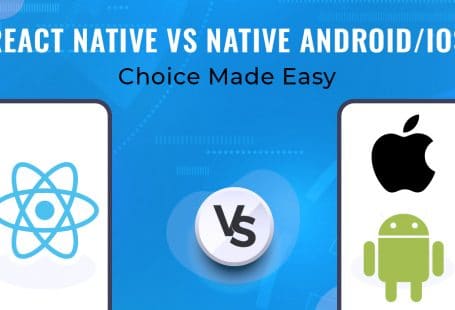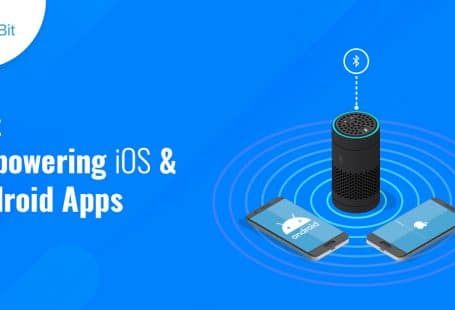For the past few years, mobile phones have become the primary source for accessing the internet and performing other day-to-day activities. Be it shopping or booking tickets, there’s almost nothing that a smartphone can not do. Today, around 3.8 billion people worldwide have smartphones, which is nearly half of the world’s total population. With this, you can imagine why companies are concentrating on developing a mobile app for their businesses. Their primary focus is to fulfil the user requirements to establish a market existence.
However, while satisfying the market needs, they sometimes overlook the crucial factors in mobile app development like app security, development cost, app maintainability, and code quality. And that’s why mobile app DevOps comes into the picture to enhance quality and reduce risks at lower prices.
This article will introduce you to the concept of DevOps in mobile app development. Moreover, we will also discuss its benefits, challenges, and how you can implement this approach in your app development project.
What is DevOps?
DevOps (a portmanteau of ‘Development’ and ‘Operations’) is a set of tools and practices that blends software development (Dev) and IT operations (Ops). It is an exclusive methodology that aims to deliver applications and services quicker than traditional software development processes.
The conventional software development practices lead to additional development costs, time, and effort, making your customers dissatisfied. However, DevOps helps bridge the gap between operations and development and overcomes the challenges related to continuous software delivery.
DevOps emphasises practical cooperation among all the stakeholders involved in producing a digital product, say an application or software. It integrates project managers, product managers, app developers and members of operational staff. The primary concept behind DevOps for mobile app deployment is to support a culture of coordination of teams that previously worked in isolation. In simple terms, it is about eliminating the barriers between conventionally siloed teams. Under DevOps, an organisation’s development and operations team work together throughout the SDLC (Software development life cycle), from development to deployment and operations.
How is DevOps Methodology Different From Agile Development?
DevOps is a modern approach that allows seamless and smooth application delivery from foundation to production. It helps break the development-operations barrier and symbolises the departure from the traditional Waterfall approach (First model of Software Development Life Cycle) to next-level Agile software development. But is there any difference between DevOps methodology and conventional Agile app development? Well, certainly there is. Let’s talk about it.

Both DevOps and Agile have been pretty popular in the mobile app development space. Today, many business owners look for at least one of these approaches to develop their application software. Some people often consider DevOps and Agile to be the same. However, that’s not true. There are some significant differences between the two.
Agile methodology stresses continuous repetition of development and testing. It breaks the product into smaller modules and incorporates them for final testing. This approach is iterative and incremental. To implement it, one can use many processes such as Scrum (delivering the business value in the shortest time), Kanban (visual system for managing software development process), etc.
DevOps focuses on interaction, collaboration and integration among development and operations to assist rapid mobile app deployment. It is a set of practices that help automate the processes, align the teams, and enhance the organisation’s efficiency to accelerate the delivery of products and services.
Many scholars and experts believe DevOps is the extension of Agile. However, the establishing principle of Agile is to bring agility or quickness only to development, while DevOps focuses on bringing skill to both development and operations.
The Essential 6 C’s of Mobile DevOps
Mainly, there are six essential elements involved in the DevOps methodology. These elements link the entire process and ensure to maintain the security and quality of software.
- Continuous Planning
Continuous planning demands bringing the whole project team together. It includes project managers, developers, operations staff, business analysts, and other stakeholders to a common platform for deciding on the app’s scope, possibilities and identifying its results and resources.
- Continuous Integration
Continuous integration in mobile app DevOps states that code must be comprehensive and cooperative to combine the coding done by one team smoothly with that of another. It concentrates on regular error-free developments integrated with the finally built code.
- Continuous Monitoring
DevOps makes it easier for the developers to monitor and test the application before delivering it to the end-user. Continuous tracking helps detect, identify and troubleshoot problems.
- Continuous Testing
Testing is an essential part of all the development lifecycles, no matter what. It helps spot bugs and errors in the application beforehand to fix them and deliver quality products to clients. The primary goal of Continuous testing is to examine the application in advance and often.
- Continuous Deployment
Continuous deployment is a process in which every code that passes the automated testing stage is forwarded automatically to the production stage.
- Continuous Delivery
It deals with the delivery of software and updates to the production environment in smaller portions to ensure the delivery at any time. Continuous delivery makes sure to develop, test and distribute to the customer continually in smaller cycles.
How to Implement Mobile DevOps?
So now, If you have made up your mind to use the mobile app DevOps, you need to know about the three fundamental steps involved in it. Here are those three critical steps you need to follow:
Continuous integration and delivery
As mentioned above, the developers must practice writing code in a manner that easily integrates with others. The workflow should be such that you can smoothly incorporate the code written by one team with the code delivered by another. All the development assets, including text files, scripts, documents, codes and configuration, must be transparent and traceable.
Moreover, with continuous integration, you should take care of continuous delivery as well. It is significant to launch the product as soon as it is ready. Although you can perform all this manually, you should automate the processes when the demand increases.
Testing and monitoring
A wide range of factors determines the success of a mobile app. These factors include a broad range of devices an application has to run on while simultaneously considering the devices’ specifications such as screen size, resolution, features, etc. Therefore, testing becomes significant not only on simulators and emulators but also in the real environment. Continuous monitoring and automated testing enhance the process of managing development, bug identification, and troubleshooting.
When you are ready for mobile app deployment, you need to examine its performance in the live setting. Your application may perform well in the test environment but fail in the real environment. Various factors can be responsible for this, such as network conditions, memory, power, etc. Therefore, it becomes critical for developers to implement continuous performance monitoring by enabling third-party SDKs like logs, crash reports, etc., to figure out the cause of failure.
Quality control
It is crucial to measure and validate all parts of the code from start to delivery, including any changes applied in between. You should constantly monitor customer feedback and ratings on the app store. It helps in identifying the issues and paves the way for improvements and modifications.
How is DevOps Important? Benefits of DevOps in Mobile App Development
- Speed: Correctly implementing the DevOps practices lets you move at the speed you need to innovate faster, adapt to changing market trends, and become systematic at driving business results.
- Rapid delivery: When you enhance development processes, you can improve your product faster, deliver it quickly, and develop a competitive advantage.
- Reliability: DevOps practices like continuous planning, integration, and delivery ensure the application’s quality and performance. It helps in reliably delivering the applications rapidly while maintaining an optimum experience for end-users.
- Improved collaboration: Under a mobile app DevOps project, developers and operations teams collaborate, share responsibilities, and combine their workflows. It reduces inefficiencies, saves money, effort and time.
- Security: Although DevOps is a rapid development approach, it does not mean it compromises the security of your sensitive data. By using automated, integrated security testing tools, you can develop your app quickly and ensure the proper safety of the data associated with it.
- Enhanced innovation: When all the tasks work according to the strategies, you can deliver top-most quality products on time. Moreover, since product delivery is done on time, you can be more creative and implement innovative ideas.
- Reduces risks: As already mentioned, testing is primarily focused while using the DevOps approach. Therefore, no matter how many changes occur in the development lifecycles, continuous and automated testing reduces errors and low-performance risks.
- Better software quality: When you merge the agile approach with DevOps, it helps better collaborate and solve issues quickly. Moreover, DevOps deals in proper planning, monitoring, testing that enhances performance. Hence DevOps results in high quality and stable software.
Challenges While Using DevOps in Mobile App Development
There is no doubt that using DevOps in mobile app development can be beneficial for your business growth. However, there are particular challenges that you might face while accepting mobile app DevOps. Here are some of the challenges that you might encounter while incorporating DevOps in mobile app development:
Multi-platform support
Today, most applications target multiple environments and platforms that include various operating systems, hardware and devices. Therefore, it becomes crucial to integrate DevOps carefully so that it can work perfectly with your mobile application irrespective of the platform it runs on.
Mobile app testing
Testing is a must for all products to achieve success. You need to examine your app’s functionalities, design, and utilising performance before launching it in the market. However, testing different parts of your DevOps integrated mobile applications can be cumbersome for various platforms and devices.
Approval by app stores
You can not simply develop an app and proceed for mobile app deployment directly into a smartphone. You first need to get it registered in the respective app stores from where users can download and install them into their devices. Therefore, it becomes crucial to follow an app store’s guidelines carefully in order to get approved by them.
Wrapping Up
The benefits of DevOps in mobile app development are extensive, but their outcome is constant – they can portray you as a game-changer. Although DevOps is a general approach that works with different kinds of application development, for mobile app development, it can certainly be a good choice. From cost reduction to accelerated growth, mobile app DevOps got you covered in all the spheres of mobile app development. Therefore, you can reap the maximum profit and expect unmatched business growth by successfully implementing DevOps in your mobile app development project.




